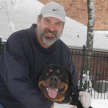
Maybe some kind of ancient, magic writing hid in the serving platter's blue willow pattern. Something gave it the power to defy gravity. Once the soapy plate slipped from Sandy's fingertips, it hung in the air while her hands hovered around it like a pair of nervous hummingbirds.
Sometimes things moved this slowly in the nightmares, where Sandy studied the horrible, majestic path of a bullet as it parted a curtain of flesh and gristle. The things you dreaded seemed never to end. The good things flew by so quickly. Time stood over Sandy like some bearded, teasing god, even as her panic sent her diving for the plate. Her frantic movements became caught up in the object's suffocating slowness, like a butterfly in a fold of gauze.
Sandy never dwelled on the unfair things that erupted in her life. There were so many, she couldn't have found the time if she wanted.
At the most tender age, she knew she would marry Bob Strunk. One afternoon in the sixth grade, the boys got to stay in the classroom to talk about baseball. The girls were herded off to the gym where they learned about feminine things. Then they were sworn to secrecy, as if the teachers didn't realize that young boys had older brothers to guide them through the mystery. Sandy knew she and Bob shared true love because all the other cute boys tormented the girls about the secret hygiene class after that. Bob pretended he didn't even know or care where they had been.
During the most vulnerable junior high years, Bob would walk her home from school. One afternoon in spring, the world reached a perfect balance. The sky vaulted over them like a brilliant, painted shell. The ground had finally thawed and the first, shy flowers perfumed the air. Sandy had survived her period. It was still too soon for mosquitos to be a problem. They walked together and owned the world.
Without warning, Bob grabbed her purse and bounded a safe distance away. "What's this?" he asked, crinkling his nose so that his freckles seemed to pour into a funnel. Then he pulled out whatever his hand had found: a comb or a photograph.
"Stop, Bob," Sandy pleaded. "Give it back." Her voice became more desperate when she suddenly remembered what else hid in her purse that day. "I mean it, Bob. Please."
Bob's hand dipped in again, and his eyes stared far off into space, like a blind man reading Braille. Sandy knew her life would absolutely end when they saw, together, what was in Bob's hand. She froze in one of those helpless moments where the suspense dragged into eternity, where she would have sacrificed his life, and then her own, just to end it.
But Bob's animation drained out. His hand came up empty. He moved back to her. "Here's your purse," he said. "I was just fooling around."
Boys had it so easy.
They were just kids when she saw Bob and his buddy slice their thumbs, press the wounds together and call themselves blood brothers. It was something special for them, something they could choose to share until the end of time.
Sandy found out that girls were bound by blood in a different way, but there was nothing special about it, nothing you would want to share. And, of course, there was no choice. Even in those days, time toyed with her. It upset a schedule that should have been as predictable as the moon, leaving her bloated, miserable and ugly whenever she seemed poised for happiness.
So, even though Sandy's bond of sisterhood renewed itself
month upon month, she never seemed to connect with the other girls.
She liked Kathy Smith. Kathy knew all the bands and all the words to their songs. She tantalized Sandy with hints of sophistication. Sandy ran into Kathy and Suzanne Nicols in the courtyard between classes in the spring of her seventeenth year. Kathy's eyes looked radioactive, they were so red and puffy. She'd just broken up with Jeff.
"I'm sorry," Sandy said, touching Kathy's elbow.
"Why?" The girl looked away from her. "You didn't do anything."
"I mean I'm sorry for what happened. I'm sorry he treated you like that."
"Who told you how he treated me?" Kathy's breath fell out in a few ragged chunks. "What do you know about anything?"
"I'm sorry," Sandy's heel moved onto a rock, and she stumbled in a little curtsy. "All I said was I'm sorry."
"You are not. How could it mean anything to you? You're pretty." Kathy's voice rose as the unfairness of it all struck her. "You don't know anything about hurt," she screamed. "You're just like all the other pretty bitches, god damn you."
Her classmates envied her. They thought she had everything, and in an unfortunate way she knew they were right. The brainy girls came to her for advice about make up. The cheerleaders wanted help with their homework. Either way, she felt marked, set apart from those around her.
So, by the time she was eighteen—years-old after first kindling the romance with Bob Strunk—she had a tough time convincing herself that she was better off when he dumped her.
It was all because she did too well on the Probability and Statistics final. Mr. Dalton of Prunes graded on the curve, so when Sandy outscored Bob, he missed out on being valedictorian. All he had left were cute dimples and a perfect attendance record. He couldn't stand the sight of her anymore.
Sandy had learned to bury that kind of hurt. And the man-made woes of womanhood were too common for her to feel any personal resentment. Sometimes it seemed like each pain prepared her for the next and enabled her to get through it. In just twenty-five years, she'd learned to deal with so much . . .
For all she knew, every cold, brutal father could ply his vice and then switch at an instant to a doting, public facade. And if she had stopped to think about it, she would have figured that everyone was tormented by a private version of Stephen X—sort of a fallen guardian angel.
The one thing that Sandy couldn't cope with was the way time itself had singled her out. She knew that it didn't present itself to other people the way it did to her. Nobody else moved in the fits and spurts that colored her life. Nobody else seemed to be caught up in these cycles—of events, of emotions—that dragged Sandy by the hair out of one day and threw her into another.
Sandy Skinner understood that time was like plumbing, something essential and universal and dependable that the rest of the world could take for granted. But Sandy's pipes were always freezing up, or filthy clots were oozing from her faucets. She might even find the flow suddenly reversed, sucking her back into the things she'd so desperately wanted to forget.
Once she felt the floor tile pressing her cheek before she knew what day it was. As consciousness seeped back in—slowly at first—her head roared with pain, like her brain had been twisted sideways in its casing.
She opened her eyes half a slit, not for fear of what she would see, but because that was all she had the strength to do. At first she thought the redness was a great light intruding upon her eyelids. At some point, she realized that it was not that at all, but a tiny, uncharted ocean of blood that swept her away on its tide.
She didn't feel fear when she heard the voice. Not fear in the sense that something bad would happen to her. She wasn't afraid that something would kick her injuries into a whole new category, the way crash victims move from serious condition to critical.
The terror she felt was on a much higher level when the voice boomed out, like thunder through the valley.
"Sandra." Her eyelids quivered when she heard her name. A sense of identity began to fill the aching vacuum of her being. She knew she had to protect someone at all cost, but she couldn't picture that person's face yet.
"Sandra!" The voice's peal reminded her so much of her father.
As a child, she had wanted to shrink back into the pew whenever her father took up a hymnal. His deep, confident bass, which lurked a full octave beneath his speaking voice, could drown out the entire congregation. It was as if he thought all the world's spiritual composers lived in grottos and wrote their music with giant frogs in mind.
One especially humiliating Sunday morning, Sandy prayed for invisibility as they shuffled through the line to the church's door. She could already smell the promise of safety on the breath of lilacs outside when she glanced behind her. She saw Mrs. Swenson pinch the shoulders of her pink, lacy dress, straighten her pearls and cut through the crowd in four quick, determined strides. The woman touched Sandy's father on the arm and said, "I've been meaning to tell you how beautiful your singing is, Jack."
The woman peered into his eyes for a moment, then looked quickly down at Sandy. "You must be terribly proud of your father, young lady."
Before Sandy could say anything—which was just as well because she had no idea what she was expected to say—the woman looked at her father again in a way that she had never seen her mother look at him.
A long time had passed since that day on the church steps. Sandy tried to gather her thoughts, to remember what point her life had reached. Was it her baby sister she had to save? Or did she have a child of her own to protect? Through the clouds of pain, she couldn't even remember what dangers they faced.
She'd lost track of everything, but she knew this place and this situation very well. Sandy seemed to bounce between two parallel lives. One involved eating, sleeping, routine chores. The alternate consisted of blinding pain, terror, confusion. Whichever realm she lived in at the moment, she remained aware of the other, but unaffected by it, like the description of someone else's dream.
"Sandra!" The voice boomed out once more. "Sandra, get up, God damn it!"
For the rest of her life, Sandy would remember that moment as the first time she noticed how much Stephen X sounded like her father.
And now the plate, which had remained motionless for so long, suddenly shattered in a million blue and white pieces on the kitchen floor.
"Johnny F. Skinner, what the hell are you doing in there?" Sandy heard Linda's voice through the screen door, but for a moment she couldn't remember exactly who Linda was, or whose house they were in.
"Answer me, Johnny F., or someone's going to tan your hide."
The door screeched open, and then the spring slammed it shut behind Linda. Sandy looked up, with tears welling, and held out a few of the plate's biggest shards.
"Oh," Linda said, "It was you."
Johnny ran into the kitchen with Saury in tow.
"We didn't do nuthin', mom."
Linda headed for the dustpan. "Don't worry about it, honey," she said to Sandy. "It was chipped anyway."
_________________________
Go back to Chapter 1 of Stress Test.
Go to next chapter.
_________________________
Complete novel is available on amazon.com.
About the Creator
Alan Gold
Alan Gold lives in Texas. His novels, Stress Test, The Dragon Cycles and The White Buffalo, are available, like everything else in the world, on amazon.






Comments
There are no comments for this story
Be the first to respond and start the conversation.